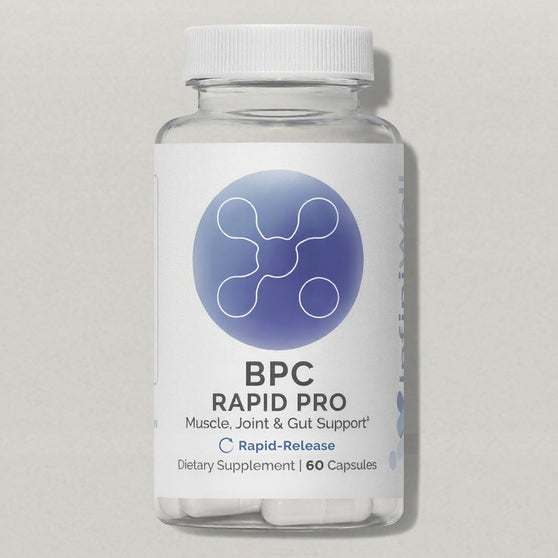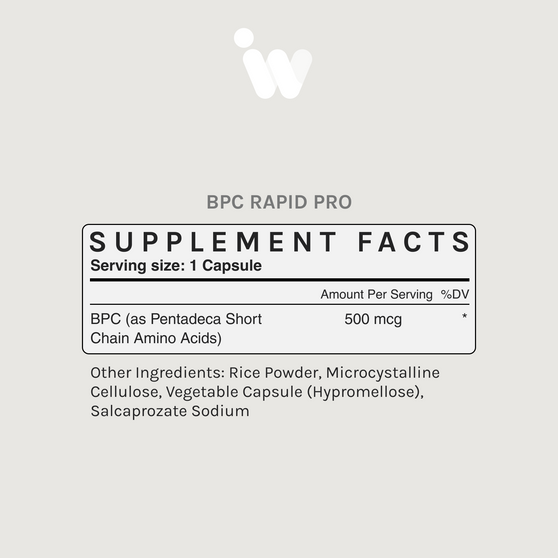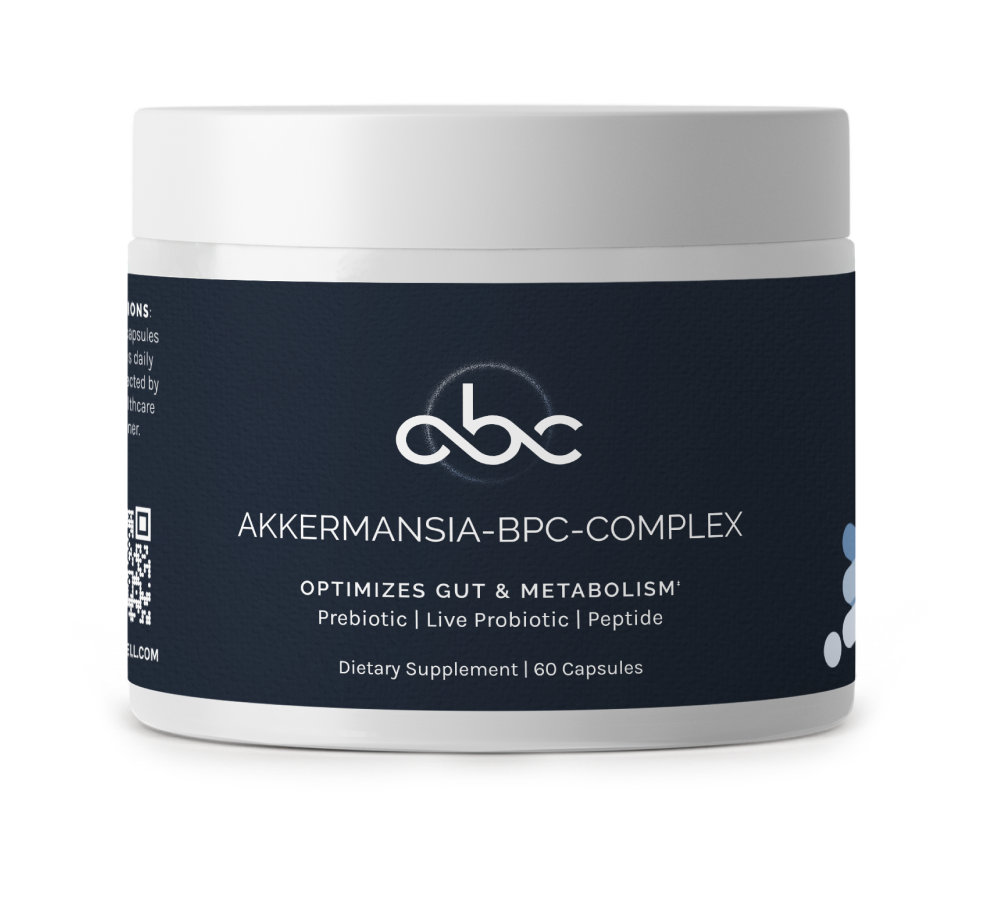Key takeaways
-
Many athletes overlook the role of gut health in performance, recovery, and long-term wellness.
-
Overly restrictive “clean eating” may unintentionally harm the gut microbiome and digestion.
-
Digestive health is deeply connected to nutrient absorption, immune balance, and energy production.
-
InfiniWell offers products like GI Prime and Control to support gut function and metabolic rhythm.
-
Small shifts in nutrition and supplement strategy can support digestive resilience and performance sustainability.
The overlooked connection between digestion and performance

For many athletes, nutrition is focused on macronutrient ratios, calorie timing, and “clean” food lists. While these strategies may support short-term goals, they often miss a critical piece: digestive health. The gut is not just a passive tube for food—it’s an active, dynamic system that breaks down nutrients, manages stress responses, and regulates energy.
A central part of this system is the gut microbiome—the community of gut microbes that live throughout the digestive tract. These beneficial organisms play a role in everything from nutrient synthesis to immune modulation. Disruptions to this microbial ecosystem can impair digestion, limit nutrient absorption, and increase fatigue.
Poor digestion can lead to symptoms like bloating, fatigue, irregular bowel movements, and suboptimal recovery. What many don’t realize is that these symptoms often start in the gut microbiome—the trillions of bacteria that help regulate digestion, absorption, and immune activity. If this ecosystem is thrown off, so is the rest of the body.
What athletes get wrong about "clean eating"
“Clean eating” is often promoted as the gold standard for performance, but in practice, it can become overly restrictive. Athletes may avoid entire food groups, limit dietary fats, or eat the same repetitive meals with little variety. While this might reduce exposure to additives or allergens, it can also starve the gut of the fiber and prebiotics it needs to thrive.
A gut that lacks dietary diversity can lose microbial diversity—a key marker of digestive health. This can affect everything from immune balance to nutrient availability. Studies suggest that highly restrictive diets can negatively affect gut integrity and even increase food sensitivity over time.
Rather than focusing on overly simplified rules like “no carbs” or “only whole foods,” athletes benefit more from a nuanced approach that balances clean eating with gut-friendly habits.
Signs your gut isn’t happy—even if your diet is “perfect”
You might be following all the textbook rules: lean protein, complex carbs, healthy fats, no added sugar. Your meals might be perfectly portioned, meal-prepped, and designed around your training cycle. But even when everything looks ideal on the outside, your gut may be sending signs that something’s off internally. Digestive health isn’t just about what you eat—it's about how your body processes, absorbs, and responds to that food.
Here are a few warning signs that your gut might be struggling:
-
Bloating or gas after meals: Even healthy meals can lead to discomfort if the gut microbiome is imbalanced or if digestive enzymes are insufficient. This often signals poor breakdown of food, particularly proteins or complex carbs.
-
Fatigue or brain fog, especially in the afternoon: When digestion is inefficient, it can divert energy from other systems, leaving you feeling sluggish or mentally foggy. This may relate to poor nutrient absorption or fluctuations in energy availability.
-
Constipation or urgency: Both extremes can indicate irregular gut motility or microbial imbalance. These issues can interfere with performance, especially in endurance training where consistency and comfort matter.
-
Undigested food in stools: This suggests your digestive system isn't fully breaking down food, which means your body is missing out on key nutrients. It may also reflect reduced enzyme activity or compromised gut comfort.
-
Frequent colds or prolonged recovery: A large portion of the immune system is housed in the gastrointestinal tract. If gut balance is disrupted, your body's ability to recover and defend against everyday stressors may decline.
These symptoms can occur even in athletes who appear outwardly healthy and fit. They’re not always tied to what you eat, but how your gut processes it.
Gut health and nutrient absorption
Your performance depends on more than the nutrients you eat—it depends on what your body actually absorbs. If your gut lining is compromised or your enzymes are underperforming, even a nutrient-dense meal can fall short.
Micronutrients like zinc, magnesium, and B vitamins are essential for muscle recovery, oxygen transport, and energy metabolism. If absorption is poor, an athlete might feel low energy or experience plateaued performance, despite an otherwise clean diet.
This is where products like GI Prime shine. Designed to support the gut lining and digestive environment, GI Prime helps maintain nutrient absorption while supporting gut comfort and immune readiness.
The gut-brain axis in training and competition
The gut isn’t just connected to your body—it’s connected to your brain. Through the vagus nerve and a complex mix of chemical signals, your gut communicates with your central nervous system. This is known as the gut-brain axis, and it influences mood, stress response, and even mental focus.
For athletes, this means that digestive imbalances can manifest as anxiety, brain fog, or decreased motivation. Intense training, travel, and poor sleep can all increase this strain. Supporting gut health supports mental resilience—especially when stress is high.
Also read: The Gut-Brain Connection: How Probiotics, Postbiotics, and Akkermansia Impact Your Mood
Common habits that backfire on gut health
Despite good intentions, some common fitness nutrition habits can do more harm than good:
-
Overusing protein powders: These can overwhelm digestion and displace whole-food sources of fiber and nutrients.
-
Cutting carbs too low: Carbohydrates, especially from plants, feed beneficial bacteria in the colon.
-
Eating in a rush: Lack of chewing and distracted eating reduce enzyme activity and gut signaling.
-
Relying on artificial sweeteners: Some sugar substitutes may disrupt the microbiome or promote bloating.
While not all athletes fall into these traps, even a few of these habits can negatively impact digestion over time.
What to do instead: smarter gut strategies
Rather than overhauling your entire diet, consider layering in strategies that help your gut adapt, recover after over-exerting, and function more efficiently:
-
Rotate your foods: Instead of chicken and rice every day, diversify with lentils, fish, sweet potatoes, and fermented foods.
-
Eat slowly and mindfully: Give your digestive system time to produce enzymes and stomach acid.
-
Support your microbiome: Include prebiotic-rich foods like garlic, onions, asparagus, and oats.
-
Supplement intentionally: If digestive discomfort is common, products like GI Prime and Control can support digestive rhythm and overall gut comfort.
These changes may seem small, but they create big shifts in how your gut handles stress, food, and recovery.
InfiniWell support for digestive wellness
At InfiniWell, we’ve designed solutions to work with—not against—your body’s natural systems. GI Prime is formulated with nutrients that support gut lining health, microbial balance, and digestive comfort. For athletes under high stress or training loads, this can make all the difference.
Control supports metabolic balance, helping to regulate blood sugar, blood pressure, and immune resilience—all of which are impacted by gut health. Together, these formulas offer foundational support for performance and recovery.
Final thoughts: Gut health as a foundation for athletic success
Gut health isn’t a bonus—it’s a baseline. For athletes, it can be the difference between sustainable progress and stalled performance. "Clean eating" has its place, but when it becomes overly rigid, it can backfire by neglecting the gut’s actual needs.
By shifting focus toward digestive resilience, athletes can unlock more consistent energy, better nutrient absorption, and improved recovery. With support from InfiniWell products like GI Prime and Control, your gut gets the tools it needs to keep up with your goals—today and over time.
-
SOURCES





















